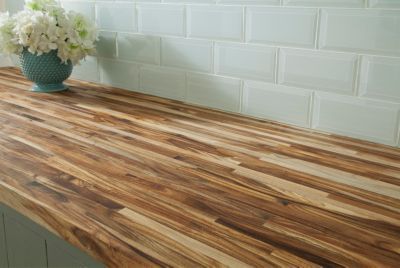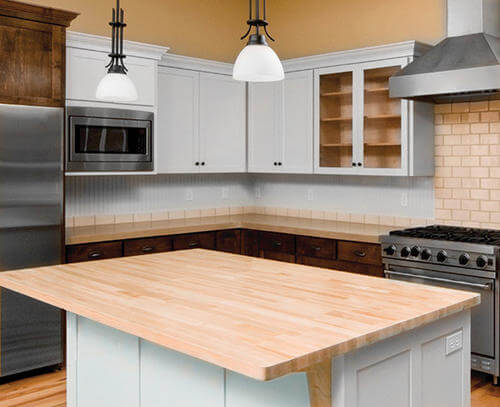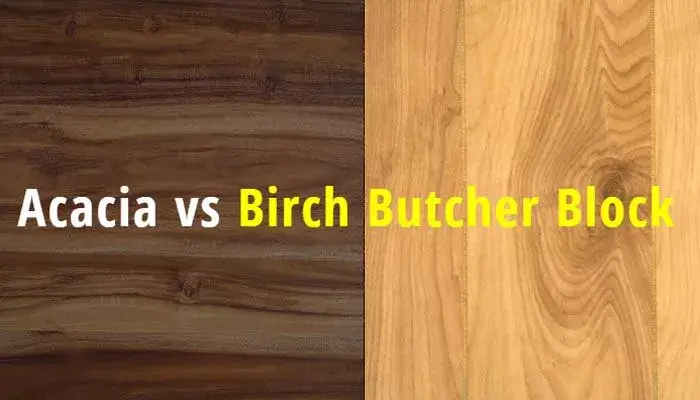Acacia and birch wood are common features in local lumber yards. They are excellent but readily available hardwoods.
Therefore, woodworkers frequently use them on standard furniture and other wooden items, including cutting boards. The two also make great wooden countertops.
So, between acacia vs birch wood, is one better than the other? Or can you use them interchangeably without altering your project outcomes? That’s what we seek to find out in this guide.
Is Acacia Better than Birch Wood?
Yes, acacia is better than birch wood in many regards. First, it’s stronger than birch wood. Secondly, acacia is more resistant to scratches and dents than birch wood. Above all, acacia is naturally more beautiful than birch. That said, birch wood is easier to work with and often has fewer wood defects.
Overview
You’ll often come across acacia vs. birch wood comparisons because they are two of the best affordable hardwoods.
They are hard, strong, and durable. Both birch and acacia are also beautiful. Indeed, they are the two most commonly used wood types for mid-range indoor furniture.
Nevertheless, the two wood types aren’t 100% similar. So, you should think carefully when choosing one for your next project.
What is Acacia Wood?

Acacia wood is lumber derived from the acacia tree. Also known as mimosa or the thorn tree, the acacia tree is a deciduous hardwood native to Australia and several other tropical and subtropical regions. It’s very common in Africa, Asia, and the Pacific coast.
Acacia Wood Properties
Acacia wood is characterized by a deep brown color with attractive figured grains that give it a naturally beautiful appearance. In addition, it’s a very strong wood at 1700 lbf on the Janka scale.
Indeed, the Bubal acacia is rated an impressive 2,300 lbf on the Janka scale, making it 23% harder than hickory. Its hardness and strength properties make acacia wood durable and highly resistant to wear and tear.
Acacia wood is weather-resistant, rot-resistant, and moisture-resistant. It’s also resistant to termites and many other insects.
Additionally, acacia and teak wood possess weather-resistant qualities, thanks to their natural oils that repel water. Here’s on “Which is Better: Acacia Wood vs Teak Wood.”
Acacia Wood Pros and Cons
The following are acacia wood cons and pros answer the question;
Acacia Wood Pros
- It is strong
- It’s durable
- Scratch-resistant
- Naturally beautiful
- Weather-resistant
Acacia Wood Cons
- It’s sensitive to heat
- Acacia wood is heavy
- Grain variations and knots
Uses of Acacia Wood
Most people use acacia wood outdoors or for furniture making. It’s especially popular for outdoor patio furniture due to its durability and weather resistance.
However, it has many other applications in woodworking, such as making wood cutting boards and dining tables, and construction, such as support beams.
What is Birch Wood?

Birch is a deciduous hardwood tree from the genus Betula. Native birches are found in temperate or boreal climates, especially across the northern regions of America. There are more than a dozen birch species.
However, the most common are paper birch, yellow birch, sweet birch, European birch, and the Himalayan birch.
Birch Wood Properties
Birch is a straight-grained hardwood characterized by wide, white sapwood and narrow reddish-brown sapwood. It is also a hard and strong wood, scoring 1260 lbf on the Janka hardness scale and boasting an 8170 bending strength.
These qualities make it extremely durable. Indeed, birch wood items can last many years without dents and scratches. Yet, that’s not the end. Birch is highly dimensionally stable, meaning it doesn’t lose shape when drying. It’s also lightweight and highly workable.
Unfortunately, birch isn’t weather-resistant. It absorbs too much moisture, increasing the risk of rot and decay. Therefore, it’s not ideal for outdoor furniture or construction projects.
Birch Wood Pros and Cons
Is birch wood good for woodworking? The following are the pros and cons of this highly in-demand wood to answer your question;
Pros
- Strong and durable
- It’s naturally beautiful
- Highly dimensionally stable
- Lightweight and highly workable
- Staining birch wood is easy
- Birchwood is affordable
Cons
- It is not moisture-resistant
- It’s not rot/decay-resistant
- Not ideal for outdoor furniture
Birch Wood Uses
Birch is the most widely used wood for veneers and plywood worldwide. Birch plywood boards are beautiful, lightweight, and strong. Other uses of birch wood include interior trim, making wooden boxes, cabinetry, and furniture making.
Related: Birch vs maple plywood
Acacia Vs Birch Wood: Head-to-Head
Now we know the basics of acacia wood and birch wood. So, let’s compare them head-to-head to determine whether you can use them interchangeably.
1. Appearance
Acacia and birch are completely different wood types appearance-wise. Whereas acacia is deep brown or almost golden, birch wood is predominantly white (thanks to the wide sapwood) with a narrow, reddish-brown heartwood.
Both have straight grains, though figured wavy patterns are common in acacia.
2. Strength and Hardness
Acacia wood is far harder than birch. A quick evaluation on the Janka hardness scale reveals that acacia is 1700 Janka while birch is around 1260 Janka.
Therefore, acacia is more resistant to scratches, dents, and everyday wear. Meanwhile, birch is more workable.
3. Birch vs Acacia: Durability
Both are highly durable in the right conditions. However, acacia wood is slightly more durable than acacia as it’s more resistant to scratches, dents, and damage. Therefore, you can expect to see your acacia furniture for much longer.
4. Water and Rot-Resistance
Acacia wood is significantly more water and rot-resistant than birch wood. It’s also more weather-proof. Unfortunately, birch is classified as a perishable wood because it absorbs moisture and water easily and thus rots quickly.
However, pressure-treating birch wood can significantly improve its water and rot resistance.
Read Also: Acacia Wood Stain Application
5. Price
Birch is more affordable than acacia for many reasons. First, birch is an American native hardwood, while acacia is an exotic species. So, shipping costs alone mean that acacia is likely to be more expensive than birch.
Additionally, birch is stronger, more durable, and more beautiful than acacia. Therefore, it’s more valuable.
6. Sustainability
Generally, both acacia and birch are sustainable woods. However, a few birch species are considered endangered. For instance, the cherry birch is under serious threat of extinction due to deforestation in Ontario.
The Virginia round-leaf birch is also endangered. These endangered birch species are more expensive than sustainable species.
7. Uses
Acacia and birch wood share many applications. For instance, both are the best wood for kitchen countertops, butcher blocks, and indoor furniture. However, some of the applications also differ.
For instance, acacia is one of the best woods for outdoor benches and construction beams. Meanwhile, being softer, birch makes better-engineered wood products, such as plywood and veneers.
Is Acacia Wood Good for Countertops?
Acacia wood makes great countertops due to its hardness, resistance to staining and scratching, and beautiful grain patterns. It’s also one of the more affordable hardwoods, making it a great option to replace your old countertop without breaking the bank. Installing acacia countertops is easy, too – hire a professional for the best results.
Here is a guide comparing walnut and acacia wood for making countertops.
Acacia vs Birch Butcher Block
Acacia is harder than birch, making acacia butcher block more durable than birch. Additionally, acacia is more moisture and rot-resistant. As a result, acacia cutting boards are equally long-lasting compared to birch boards.
However, treated birch butcher block countertops are almost as good as the wood is strong, durable, non-toxic, and boasts tight grains.
Read also: Is pressure treated wood good for outdoors?
Birch vs Acacia Verdict
Acacia and birch and popular deciduous hardwoods as they’re strong, durable, and beautiful. However, acacia is preferable among woodworkers.
- When to Use Acacia Wood: Acacia wood is an excellent choice for making outdoor furniture. It also makes excellent butcher blocks, carving, construction beams, and decorations.
- When to Use Birch Wood: Birch is one of the softer hardwoods, making it ideal for indoor furniture and interior trimming. It’s also a good choice for engineered wood products, including plywood and veneer boards.

